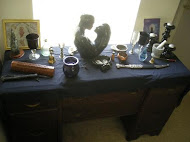Lavender is one of the herbs associated with Lammas/Lughnassadh, and is a very useful herb to have around. I'm sure many are familiar with it's ability to calm and relax, but here is some more information you may not have known...

Lavender, also called Elf Leaf; Nard; Nardus; Spike, Spikenard,
There are at least 28 species of Lavender. Some of the more common are: English Lavender; French Lavender; Spike Lavender; White Lavender; Pink Lavender; Woolly Lavender; Spanish or Italian Lavender). Lavenders are native to the western half of the Mediterranean. Now cultivated in many countries, it was thought the finest Lavender grew in England and thus the common name English Lavender evolved and is still the name most folks use when referring to Lavender products. Used not only to make life smell richer and more tolerable, but also as a medicinal relief for ailments from headaches to insomnia, Lavender oil has always been a prize.
The name Lavender was thought probably to have come from either the Latin verb 'lavare' (to wash) or 'livendulo' (livid or bluish). The Greeks referred to it as Nardus after Naardus in Syria, and Indian people called it Spikenard, which referred to the shape of its flowers.
Lavender is an herb most personal. One person's favorite may be way down on someone else's list. In ancient Egypt, lavender was used for embalming and cosmetics. The ancient Greeks called the lavender herb nardus, after the Syrian city of Naarda. It was also commonly called nard. Ancient Romans used lavender for its healing and antiseptic qualities, for deterring insects and in washing. Also, lavender was strewn on the floor to sweeten the air, fumigate sick rooms and as incense for religious ceremonies. Romans lavishly perfumed themselves using aromatic oils to perfume their bodies, hair, clothes, bed, baths, military flags and the walls of their houses. Women hung lavender next to their beds to incite the passions. The plant experienced a renaissance in Tudor England, when Henry VIII dissolved the monasteries and lavender moved to domestic gardens. The Ladies of the Manor had several uses for it; it was placed among linens, sewn into sweet bags, used to freshen the air and mixed with beeswax to make furniture polish. It was traditionally planted near the laundry rooms and linens and clothing laid over the plants to dry whilst absorbing the lavender's fresh odor. It was also used to repel insects. Queen Elizabeth I loved lavender, and used it in tea to treat her frequent migraines and as a perfume. Lavender was regarded as an effective, reliable protection against infection in 16th Century France. Smaller bags were worn in the cleavage of young women in the hope of attracting a suitor. Lavender was used to dress war wounds in WW1, when medical antiseptics were in short supply.
Today, lavender is used to induce sleep, ease stress and relieve depression. It is also used as a tea, for compresses for dressing wounds and to apply to the forehead to relieve congestion on sinuses, headaches, hangovers, tiredness, tension and exhaustion.
Lavender smells like it should taste wonderful, but the taste of most Lavenders is a little like turpentine. The flavor is not one that can be easily defined nor is it one most people like right away. It is like a fine wine with many subtleties. Both fresh and dried flowers and leaves are used in culinary preparations. Recipes using Lavender are generally on the sweet side but Lavender can be used to replace Rosemary and other strong tasting herbs. Or, it can be blended with other herbs, as in herbs de Provence. This mix, used in many savory dishes, often finds dried Lavender leaves and flowers mixed with other members of the mint family, like Rosemary, Sage, Oregano, Thyme and Mint.
---Medicinal Action and Uses--- The first written record of lavender's healing uses appears to be that of Greek Military Physician, Dioscorides, in 77AD. A Military Physician under the Roman Emperor, Nero, Dioscordes collected medicinal plants from the Mediterranean area. He noted that when taken internally, lavender relieved indigestion, headaches and sore throats, and externally, it was useful for cleaning wounds and burns or treating skin ailments. Roman soldiers took lavender on campaigns to dress war wounds. Pliny the Elder, a Greek writer and encyclopedist noted its benefits in helping with menstrual problems, upset stomachs, kidney disorders, jaundice, dropsy and treatment of insect bites. Lavender was used in earlier days as a condiment and for flavoring dishes 'to comfort the stomach.' It has aromatic, carminative and nervine properties. Though largely used in perfumery, it is now not much employed internally, except as a flavoring agent, occurring occasionally in pharmacy to cover disagreeable odors in ointments and other compounds.
Red Lavender lozenges are employed both as a mild stimulant and for their pleasant taste. Tincture of Lavender, a popular medicinal cordial, and is composed of the oils of Lavender and Rosemary, with cinnamon bark, nutmeg and red sandalwood, macerated in spirit of wine for seven days.The essential oil, or a spirit of Lavender made from it, proves admirably restorative and tonic against faintness, palpitations of a nervous sort, weak giddiness, spasms and colic. It is agreeable to the taste and smell, provokes appetite, raises the spirits and dispels flatulence. A few drops of the essence of Lavender in a hot footbath has a marked influence in relieving fatigue. Outwardly applied, it relieves toothache, neuralgia, sprains, and rheumatism. In hysteria, palsy and similar disorders of debility and lack of nerve power, Lavender will act as a powerful stimulant. In some cases of mental depression and delusions, oil of Lavender proves of real service, and a few drops rubbed on the temple will cure nervous headache. A tea brewed from Lavender tops, made in moderate strength, is excellent to relieve headache from fatigue and exhaustion, giving the same relief as the application of Lavender water to the temples. An infusion taken too freely, will, however, cause griping and colic, and Lavender oil in too large doses is a narcotic poison and causes death by convulsions. Lavender oil is found of service when rubbed externally for stimulating paralyzed limbs. Fomentation with Lavender in bags, applied hot, will speedily relieve local pains. A distilled water made from Lavender has been used as a gargle and for hoarseness and loss of voice. The oil is successfully used in the treatment of sores, varicose ulcers, burns and scalds. In France, it is a regular thing for most households to keep a bottle of Essence of Lavender as a domestic remedy against bruises, bites and trivial aches and pains, both external and internal.
Lavender oil is also used in veterinary practice, being very efficacious in killing lice and other parasites on animals. Its germicidal properties are very pronounced. In the south-east of France it is considered a useful vermifuge. The oil is used in the embalming of corpses to a steadily increasing extent. Dried Lavender flowers are still greatly used to perfume linen, their powerful, aromatic odor acting also as a preventative to the attacks of moths and other insects. In America, they find very considerable employment for disinfecting hot rooms and keeping away flies and mosquitoes, who do not like the scent. Oil of Lavender, on cotton-wool, tied in a little bag or in a perforated ball hung in the room, is said to keep it free from all flies. Not only are insects averse to the smell of Lavender, so that oil of Lavender rubbed on the skin will prevent midge and mosquito bites, but it is said on good authority that the lions and tigers in our Zoological Gardens are powerfully affected by the scent of Lavender Water, and will become docile under its influence.
Lavender is Sacred to Hecate, the goddess of witchcraft. Use in love spells of all kinds. Use during handfastings. Also use for healing, sleep, scrying and purification incense. Use in dream pillows to promote peaceful sleep and prophetic dreams, helping to reach the depths of the subconscious mind, health and love concerns. Use to manifest money or to attract new necessary items, in spells for love, protection, to attract good spirits, happiness, peace; promotes sleep, chastity, longevity, purification, wishes, pain relief. However, if the spell is for a desire rather than a true need, the spell could work in reverse. Leave around the house for spiritual and emotional protection. Aids in contacting spiritual beings and protects against the evil eye. Lavender was thrown into Midsummer fires by witches as a sacrifice to the ancient Gods. When combined with rosemary it was believed to preserve chastity
Lavender is a masculine herb, ruled by Mercury. Air is its element. It is best known for its properties of contentment, balance, love and good health. Use it when any of these aspects is required. Because of its delightful fragrance and its light, flowery taste, it has been used for thousands of years magically for its calming, peaceful, and sedating effects. It is often included in love spells and rituals because of it's attractive scent, and is used as an ingredient in spells for attracting money. A must for love spells to attract men. Also, a sachet of lavender flowers will help ease headaches, induce sleep and foster peace. Dried lavender stalks burn like incense sticks, and can be included in spells and rituals aimed attracting money, love, protection, and success. Individual flowers can also be dried and burned similarly for the same purposes. For sleep divination, place lavender sprigs under the pillow before bed while thinking about your desire. If you dream about anything related, you will get what you desire.
Put 2 handfuls of Lavender Flowers into a square of cheese cloth and tie with a purple ribbon use this aromatic washcloth in place of your usual one. For love, peace and good health, place Lavender flowers in a sachet to be carried on the person. Carrying a sachet or amulet containing lavender is also said to attract spirits or otherworldly entities. Fresh flowers can be rubbed on clothing for attracting love. For relaxation, purification baths, or aromatherapy purposes, run bath water over fresh sprigs or place a few drops of oil in the bath. If bathing is not convenient, simply inhale the scent from a bottle of essential oil for the same effects. Make a tea from fresh or dried lavender flowers for relaxation, peace, health, longevity, protection, and love - however, do not use a tea directly before a night of passion, as due to its relaxant and sedative properties, it will decrease sex drive. For peaceful sleep, use a few drops of essential oil on the sheets or pillows before bed.
Any way you look at them, lavenders are luscious long stemmed, aromatic necessities.
Sources:
Disclaimer: No one involved in this blog or its contents may be held responsible for any adverse reactions arising from following any of the instructions/recipes on this list. It is the reader's personal responsibility to exercise all precautions and use his or her own discretion if following any instructions or advice from this blog.















2 comments:
This was very useful information. thank you. And I like the description of yourself on the side.
Thanks so much for stopping by - and leaving a comment - LOL I get a little bit down once in a while, because even though I see the numbers indicating folks come here, no one says Hi! and I wonder if they don't just hit the page then go :)
Come back anytime - I try to makle each post as comprhensive & useful as possible, glad it (seems to be) working *grin.*
bb
dawtch
Post a Comment